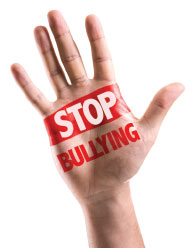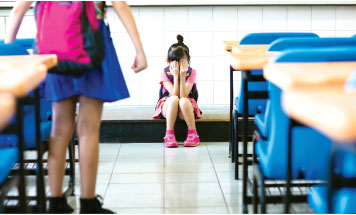Lamar Kanafani, the island’s first, and so far only, licensed marriage and family therapist, writes for WTM on the issues that concern mums.
As the new school year begins, it’s important to know the signs if all is not well.
Bullying – a reality every parent will have to deal with at some point. The truth is, bullying happens much more often than we think. And we, as parents, are sometimes conflicted about how to help our children get through these tough experiences, whether they are the victims of bullying or the ones doing the bullying. This month, we focus on what to do if your child is being bullied.
Let’s first address a few important points that are crucial to appreciate:
What exactly is bullying and what are its different forms?
Bullying is when someone, quite often, stronger or ‘more popular’ hurts or scares another person repeatedly. The behaviour is intentional, premeditated and methodical, and it takes on several forms:
Verbal Bullying includes name calling, teasing, public humiliation, spreading lies and rumours. Physical Bullying is the most obvious form of intimidation and includes kicking, hitting, biting, pinching, hair pulling, ganging-up on or plotting against another, being threatened or forced to do things and defacing one’s property. Boys are more inclined to utilise such overt methods. Some of the most subtle and covert forms of bullying are emotional intimidation and social exclusion, often utilised by girls and very difficult to detect. Racial, sexual, and cyberbullying are other forms. Cyberbullying happens by use of the Internet, mobile phones or other cyber technology and deserves a focus all on its own. All forms of bullying aim to hurt, torment, threaten, harass, humiliate and embarrass the target.
How can you tell if you child is being bullied, and what are its effects on your child?
If your child comes home with unexplained cuts, bruises or scratches, damaged or missing belongings, then I recommend investigating. Some less obvious warning signs are if your child has few friends or spends excessive time alone, seems afraid of going to school, has lost interest in school work, performs less or if they appear sad, anxious, moody, have trouble sleeping or loss of appetite, experience low self-esteem and suicidal thoughts. Other signs, often assumed to be excuses to avoid school, are repeated complaints of physical ailments. It’s important to note that they may feel they have no one to turn to. My daughter once expressed that if the parent does not listen without judgment or show compassion, then kids will not confide in their parents. Additionally, if your child complains of their teacher picking on them, yelling a lot, threatening them or intimidating them to generate behavioural compliance, then this is an outright form of adult bullying and must not be taken lightly. You must never disregard the possibility that the bully is a teacher or coach and not another kid. In this case, your child will need your utmost support.
Why do bullies bully?
In order to help your child deal with their bullies, both you and they need to understand the reasons behind bullying behaviour. The strongest influence lies in the home. Overly strict, abusive, neglectful or permissive parenting are all incentives for a child to either lash out at other kids or imitate such aggressive behaviours. Also at a higher risk for becoming bullies are children of parents who are either divorced, overly busy or tired or regularly under the influence of alcohol or drugs. Kids subject to these unpredictable and unstructured environments are insecure and use abusive behaviour to feel empowered and secure. They have not learned how to handle conflicts well. When bullies are asked to explain their behaviour, common replies include that it makes them feel stronger, they want to hang out with the cool crowd, they’re jealous, others bully them or they want to keep others from bullying them. However, bullying is a learned behaviour and can therefore be unlearned.
So, what can you do to help your child deal with a bully?
 Kids and teens look to their parents for protection and advice. Many think bullying will toughen kids up or that it’s a rite of passage. It used to be the case but we live in a different world today. There’s no easy or straightforward answer – the truth is, it’s complicated. The best way to handle a bullying situation is to assess it case by case. Each bully and each victim is different, coming from a different home environment with a different personality, different motives, emotional responses, etc. Having said that, there are several educated strategies you can utilise.
Kids and teens look to their parents for protection and advice. Many think bullying will toughen kids up or that it’s a rite of passage. It used to be the case but we live in a different world today. There’s no easy or straightforward answer – the truth is, it’s complicated. The best way to handle a bullying situation is to assess it case by case. Each bully and each victim is different, coming from a different home environment with a different personality, different motives, emotional responses, etc. Having said that, there are several educated strategies you can utilise.
My first advice would be to never stay silent. Speak out and encourage your children to do the same. Your child needs to understand that they have your full support along with the support of others. So, always report it to the school or to the police if it occurs outside the school. You can try going through the proper channels; however, take it directly to the principal if you have to by scheduling a face-to-face appointment.
Secondly, document everything, collect evidence where you can find it. Be sure to tell exactly what happened – who was bullied, who the bully was, where and when it happened. Even if you suspect a kid is being bullied, it’s a good idea to report that, too. Tell your child that if one adult doesn’t listen, tell another and another until someone does something to help. Obtain a copy of the school’s anti-bullying policy to determine if there’s a violation, so the bully is held accountable for their actions. Also, send an email to the principal recapping what actions have been agreed to stop the bullying. This will put the principal on the alert that you are watching for the agreed resolution to be honoured. Check in with your child periodically and keep the principal updated. Many of us fail to be consistent with this but it is important to remain persistent. The more seriously parents take it, the more seriously the school will take it.
If the bullying continues or occurs outside of school, you may need to move up the chain of command, reporting it to the ministry or the police. Definitely file charges if you have to. The bully needs to see that the spotlight is on them, that they have a track record following them and that they’re walking on thin ice. Let the school know of any charges filed against the bully outside of school.
Thirdly, teach your children to stand up for themselves. Many of us are taught to simply stay quiet or walk away. That may work in some cases because the bully wants to see an emotional and vulnerable reaction like fear or sadness; and if those reactions are not shown, they will lose interest and power. However, in many other cases, walking away or staying quiet can be misinterpreted as a sign of fear and weakness; they will continue to torment your child.
So the bully will need to witness a different kind of reaction from your child; one that communicates, “I’m not scared of you, and I’m ready to do whatever it takes to defend myself and put you back in your place.” I always teach my children that we never start fights, but we will certainly finish them! Feel free to verbally defend yourself, as well as physically if someone tries to hurt you physically. And then report it! Never keep the pain of being bullied to yourself.
 Sometimes it takes walking right up to the bully, look them straight in the eyes, and give them a good come-back line, like “It’s funny how you really think I care”. Sit down with your children and brainstorm ways they could verbally respond, then role-play with them so they get comfortable with verbal self-defence. It’s also important to walk away after the comeback; that takes away from the bully’s power.
Sometimes it takes walking right up to the bully, look them straight in the eyes, and give them a good come-back line, like “It’s funny how you really think I care”. Sit down with your children and brainstorm ways they could verbally respond, then role-play with them so they get comfortable with verbal self-defence. It’s also important to walk away after the comeback; that takes away from the bully’s power.
Educate your kids about the etiology of bullying. It can be confusing to them because there’s a lot of different types of bullying behaviours, some overt and some covert, and those behaviours are driven by different reasons with various intents, under different circumstances, situations, and gateways. So one of the most empowering ‘weapons’ you can give to your child is education. Which means you have to become an expert on bullying yourself. Don’t simply pass on your inherited knowledge from your own parents. Our children live in a different world, one that consists of the physical and the cyber. When your kids understand the psychology behind the behaviour and what the bully’s weaknesses are, you remove the mystery behind the behaviour and they feel less intimidated. And therefore, they are more likely to stand up for themselves. It is also important to distinguish between boy-bullying and girl-bullying. Boys tend to be more overt and obvious, with loud verbal and physical aggression. Girl bullying is harder to detect as it is much more covert, with subtle, secretive, manipulative, calculated and inconspicuous behaviours. So handling boy bullies will require different strategies than the ones used to handle girl bullies.
Your children should also know that bullies love to target loners. So encourage your children to socialise and make friends. Better yet, encourage them to be friends with someone they know is being bullied. Keep them company and include them in social circles or events. Sometimes physically standing side-by-side with the victim as an act of support will make the bully think twice. These are some of the strongest ways to minimise incidences of bullying.
There are many books and websites dedicated to helping parents and victims of bullying. Do your research and always seek professional help if you feel you have tried everything with little progress.
For further questions or support, email [email protected] or call 36 009-665.





































